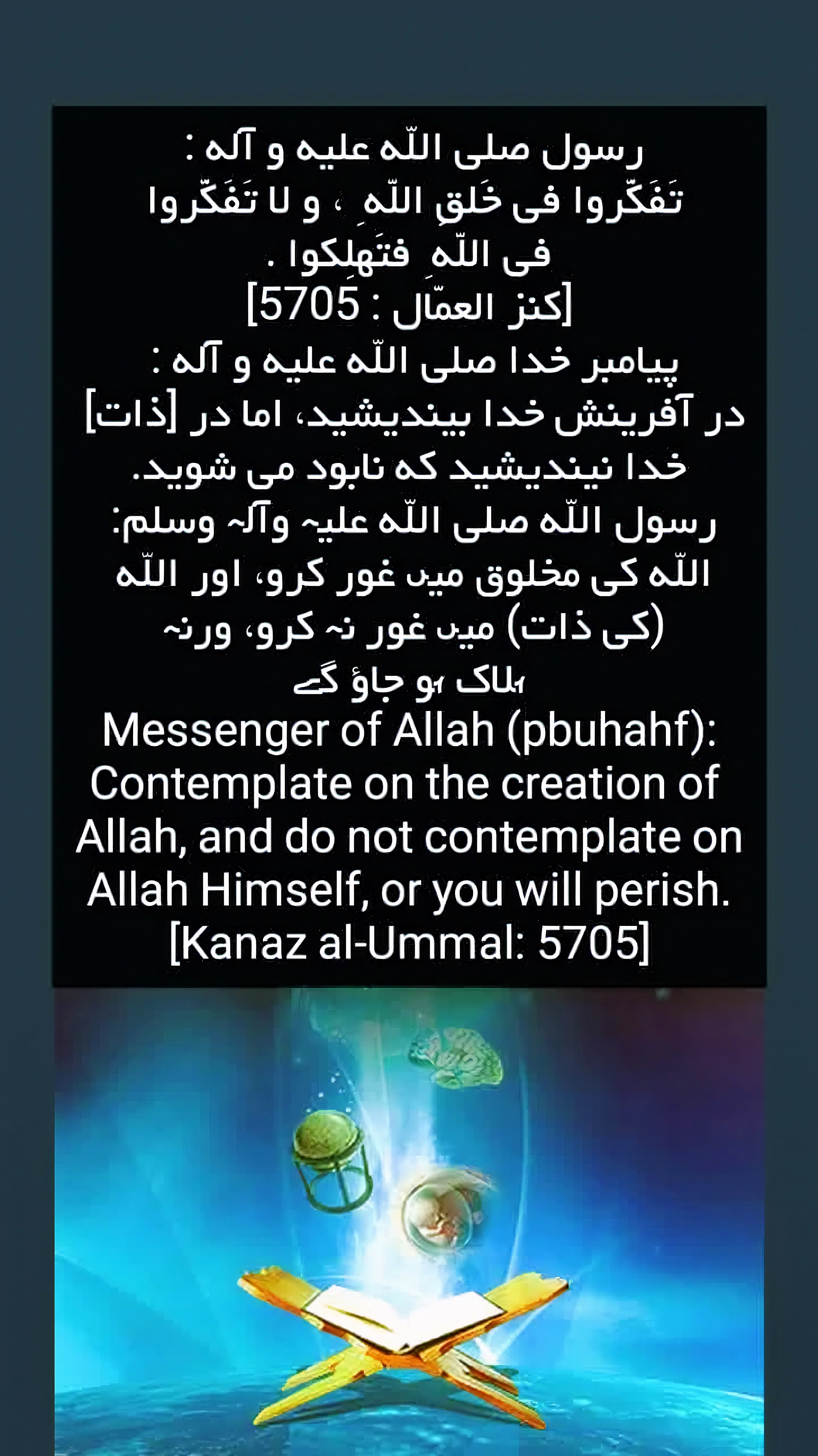Posted by Mustafa Abbas on June 19, 2024 | Views: 209 | Ratings: 48
Please wait for pictures to download, click ">" for next picture, "<" for previous picture or wait for pictures to play in slideshow.
Messenger of Allah (pbuhahf):
Contemplate on the creation of Allah, and do not contemplate on Allah Himself, or you will perish.
[Kanaz al-Ummal: 5705]
The hadith from the Messenger of Allah (peace be upon him and his family) advises Muslims to focus their contemplation on the creation of Allah rather than on Allah Himself. Here is a detailed explanation of this saying:
Translation:
The Messenger of Allah (peace be upon him and his family) said: "Contemplate on the creation of Allah, and do not contemplate on Allah Himself, or you will perish."
[Kanaz al-Ummal: 5705]
Explanation
1. Contemplation of Creation:
- Encouragement to Reflect on Creation: The hadith encourages believers to reflect on the wonders of Allah's creation. This includes the natural world, the universe, and all living beings. Such contemplation leads to a deeper appreciation of Allah’s power, wisdom, and creativity.
- Increases Faith: Observing the complexity, order, and beauty of creation strengthens faith in Allah and enhances one's understanding of His attributes. For instance, the vastness of the universe can lead to awe of Allah's greatness, while the intricate design of living organisms can inspire admiration for His wisdom.
2. Avoid Contemplation of Allah’s Essence:
- Human Limitation: The hadith advises against delving into the nature or essence of Allah Himself. This is because the human mind is limited and cannot fully comprehend the infinite and transcendent nature of Allah.
- Danger of Misguidance: Attempting to understand the essence of Allah can lead to confusion, misinterpretation, and potentially heretical beliefs. Historically, such endeavors have led to philosophical and theological errors, causing individuals to deviate from the correct understanding of Tawhid (the oneness of Allah).
- Spiritual Peril: The phrase "or you will perish" signifies the spiritual peril involved. It indicates that overstepping these bounds can result in losing one's way, leading to spiritual destruction rather than enlightenment.
3. Balancing Intellectual Pursuit and Spiritual Safety:
- Encouraged Reflection: Islam encourages intellectual pursuit and reflection on the signs of Allah in the universe. The Qur'an itself frequently calls upon believers to reflect on the natural world as signs pointing to Allah's existence and attributes.
- Boundaries of Inquiry: However, it sets clear boundaries regarding the inquiry into the divine essence. This balance ensures that believers use their intellect in a manner that brings them closer to Allah without leading them astray.
Conclusion
The hadith provides a profound piece of guidance: to engage in contemplation that strengthens faith and enhances understanding of Allah’s signs while avoiding theological speculation that could lead to confusion and spiritual harm. This approach ensures that believers maintain a healthy and respectful relationship with the divine, rooted in awe, reverence, and appropriate intellectual engagement.
Qur'anic verses and hadiths of Ahl al-Bayt (peace be upon them) and sayings in Arabic, Persian and English.
https://eitaa.com/noorunalanoor
https://youtube.com/@mustafaabbas4668?si=EnSIkaIECMiOmarE
https://youtube.com/@mustafaabbas8978?si=EMJylUW9_zruJx95
https://x.com/MustafaMir12136?t=evIJcsXutYlzpchzifFE8Q&s=09
@MustafaMir12136
For further development of personality, growth and enhancement of your talent in light of Quranic verses and traditions, with the use of calculation tools, acceleration and realization of pure Islam at the level of individuals, establishing communication with individuals and management based on people's capacity with applied study of verses and traditions, please refer to the following:
Download "Fardshanas" android application from
http://cafebazaar.ir/app/?id=ir.tolooae.fardshenas&ref=share
Individual training course for sisters
https://eitaa.com/Fardshenash_khaaharaan
Individual training course for brothers
https://eitaa.com/Fardshenas_baraadaraan
Publications
https://virasty.com/Amirjahani/1712778729411476797

